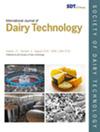The milk metabolome and its potential utilisation for enhanced dairy processing
Abstract
Background
Milk metabolomics has emerged as a valuable tool in dairy science, offering detailed insight into the molecular composition of milk. Understanding the milk metabolome is increasingly relevant to optimise milk quality, processability and traceability. As the dairy sector intensifies efforts to enhance product functionality and sustainability, metabolic profiling represents a promising approach to link animal physiology, farming practices and changes occuring during processing.
Aims
This review aimed to collate current knowledge regarding the intrinsic and extrinsic factors influencing the milk metabolome and, as a result, how the milk metabolome impacts milk techno-functionality. This review explores primary production variables, such as diet, breed, environment and management practices, and their effects on milk composition and processability.
Methods
A comprehensive literature review of the subject matter was conducted across relevant studies, selected based on their focus on milk metabolomics in the context of dairy production and processing. Emphasis was placed on publications from 2010 to 2025 to capture recent advances and emerging trends.
Major findings
The milk metabolome is affected by multiple intrinsic and extrinsic factors, including species, breed, diet, stage of lactation and health status, each of which influences nutritional value and processability of milk. As such, several milk metabolites, including choline, acetate and myo-inositol, have been correlated with gelation, a key techno-functional indicator. Furthermore, some metabolites have been highlighted as biomarkers of cow feeding systems such as hippurate, a biomarker of pasture-based feeding.
Scientific and Industrial Implications
Understanding the determinants and consequences of milk metabolome variations offers new opportunities to improve dairy product quality, tailor processing conditions and support the development of farming and traceability strategies.


 求助内容:
求助内容: 应助结果提醒方式:
应助结果提醒方式:


